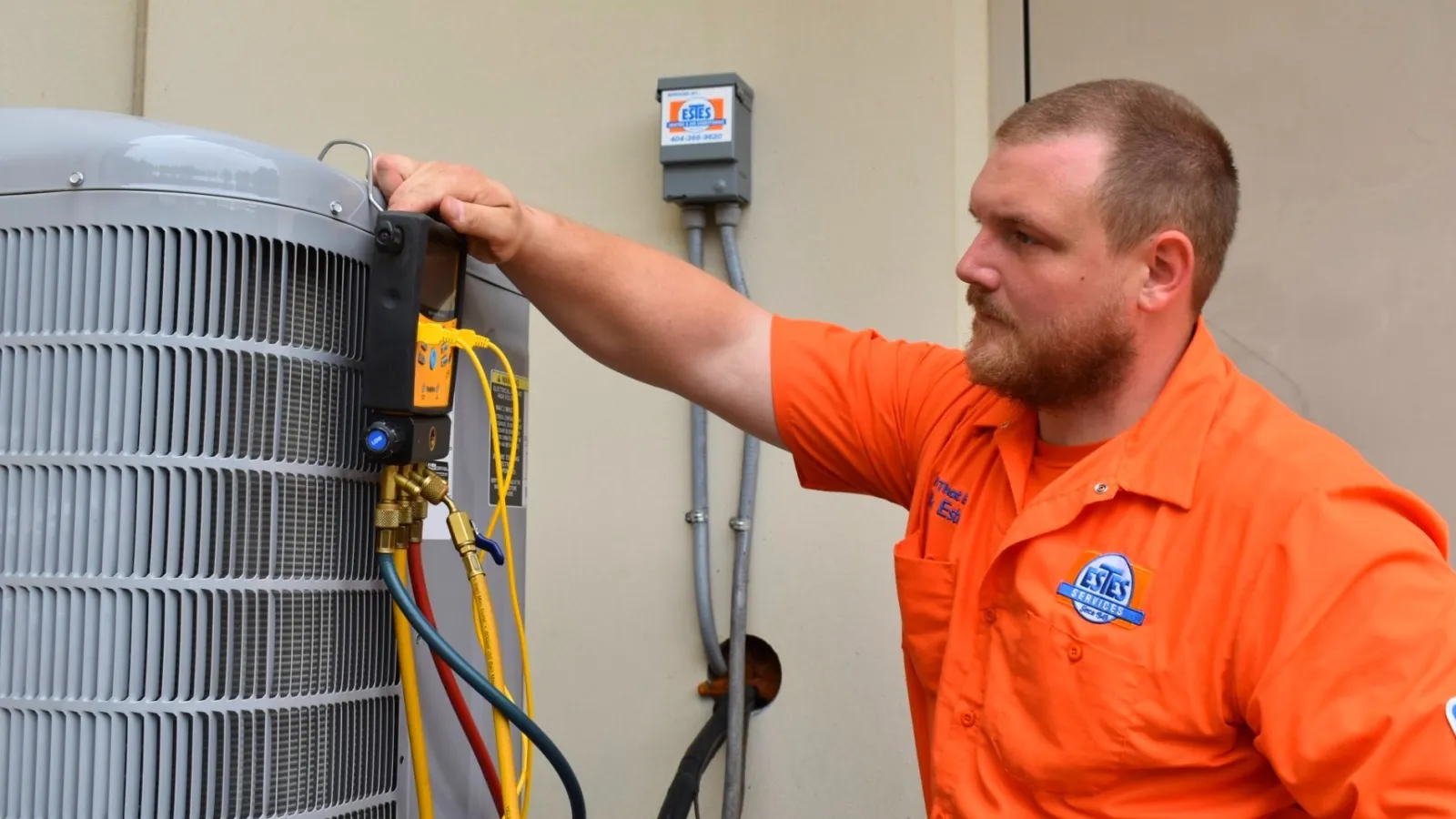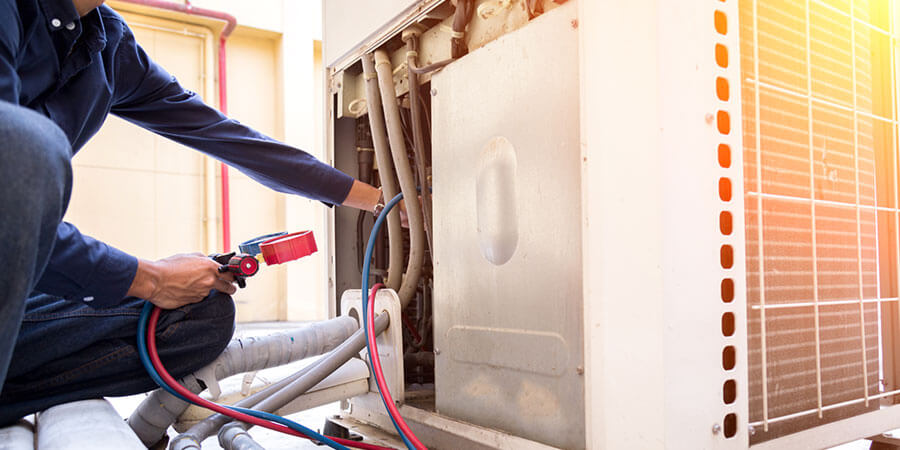Selecting Between a Heat Pump and Heater: Trick Considerations for Your HVAC Demands
When reviewing home heating choices for heating and cooling needs, the choice between a heatpump and a furnace can be complex. Each system uses distinct benefits tailored to specific climates and power performance goals. Understanding these distinctions is necessary for making an educated selection. Key elements such as setup costs and ecological influence further complicate the selection process. Which choice absolutely lines up with one's comfort and sustainability preferences? The following areas will check out these considerations thoroughly.
Comprehending Warm Pumps: How They Work and Their Benefits
While lots of home owners think about various home heating alternatives, understanding exactly how heatpump function and their benefits can greatly influence their decision. Heatpump run by moving warmth rather than creating it. In the winter season, they extract heat from the outside air or ground and transfer it indoors, while in the summer, they reverse this process, cooling down the home by getting rid of heat outside. This dual performance makes them flexible for year-round climate control.One of the main advantages of warmth pumps is their power effectiveness. They make use of substantially less electricity compared to conventional heater, potentially leading to reduced energy bills (heat pump service). Furthermore, heatpump have a smaller sized carbon impact, making them an ecologically pleasant option. They also call for less upkeep than standard systems, adding to long-lasting expense financial savings. Overall, recognizing the auto mechanics and benefits of heat pumps can assist property owners make informed decisions concerning their heating and cooling demands
Exploring Furnaces: Types, Operation, and Benefits
Furnaces are available in different types, consisting of gas, electric, and oil versions, each with distinctive functional systems. Understanding these distinctions is essential, as they impact performance and heating efficiency. Additionally, heating systems use numerous benefits, such as consistent warmth outcome and reliability in colder climates.
Kinds of Furnaces
Heater can differ substantially in design and operation, with furnaces being a preferred selection among house owners. There are several sorts of heating systems, each utilizing various fuel resources and technologies. Gas furnaces prevail, leveraging gas to generate warmth effectively. Electric heaters, on the various other hand, use electrical resistance to produce warmth, typically favored for their simple setup. Oil heaters, while much less common, are reliable in areas with restricted gas accessibility (heat pump service). Furthermore, condensing heaters make best use of energy efficiency by capturing and recycling exhaust gases. Each kind runs with a system of heat exchangers and ductwork to distribute warm air throughout a home. Comprehending the differences between these furnace kinds is essential for educated heating and cooling decisions
Benefits of Heaters
For property owners seeking trusted heat throughout cold months, the benefits of furnaces are substantial. Heating systems provide constant home heating, guaranteeing even temperature levels throughout the home. They are especially reliable in severe cold, commonly exceeding warmth pumps in freezing conditions. Various types, including gas, electrical, and oil heating systems, provide versatility to meet varied demands and preferences.Furnaces additionally tend to have reduced initial installation prices compared to heat pumps, making them a more available choice for numerous. Their durable design contributes to a much longer life-span, with many devices lasting over 15 years with proper upkeep. Furthermore, modern heaters are typically equipped with sophisticated innovation for boosted effectiveness, which can result in lowered power costs. Generally, heaters remain a dependable selection for effective home heating.

Power Effectiveness: Comparing Heat Pumps and Furnaces
When comparing energy effectiveness between warm pumps and furnaces, the Seasonal Power Performance Ratio (SEER) plays an essential function in establishing performance. Furthermore, an operational expense evaluation discloses the lasting monetary ramifications of each system. Recognizing these variables can direct homeowners in making informed decisions regarding their home heating remedies.
Seasonal Power Performance Proportion
Power performance plays an essential role in the decision-making procedure between warmth pumps and heating systems, specifically when taking into consideration the Seasonal Power Effectiveness Ratio (SEER) This statistics actions the cooling performance of heatpump over an entire air conditioning season, giving a standard way to evaluate efficiency. Higher SEER ratings suggest greater power effectiveness, converting to reduced energy intake and reduced energy costs. On the other hand, furnaces are usually evaluated utilizing the Annual Fuel Usage Performance (AFUE) score, which mirrors heating effectiveness. When contrasting these 2 systems, house owners need to focus on SEER ratings for heatpump, as they straight effect total power cost savings and ecological sustainability. A complete understanding of SEER can especially affect the long-lasting fulfillment and cost-effectiveness of the chosen a/c solution.
Operational Expense Analysis
Recognizing the functional prices related to heat pumps and heaters is important for home owners evaluating their choices. Heat pumps normally use greater energy performance, converting electrical power right into warm with minimal waste. This results in reduced month-to-month energy expenses, especially in moderate climates. Conversely, standard heating systems, particularly gas designs, may have lower in advance prices yet can sustain greater operational costs with time because of fuel costs and performance ratings.Moreover, warm pumps can operate as both home heating and cooling down systems, possibly minimizing the demand for different a/c units. While preliminary investments for heatpump may be greater, their long-lasting cost savings in energy performance can make them a more cost-efficient option for lots of families. Mindful analysis of regional power prices is vital to establish the most effective option.
Setup Expenses: What to Expect for each and every Heater
Setup expenses for heating unit can differ substantially between warmth pumps and furnaces, influencing homeowners' choices. Heatpump typically have higher in advance installation imp source prices, commonly varying from $3,500 to $8,000, depending upon the system dimension and intricacy of installment. This consists of the outdoor device, indoor handling system, and necessary ductwork modifications. On the other hand, heaters have a tendency to have reduced preliminary costs, balancing in between $2,500 and $6,000, which can be appealing for budget-conscious property owners. Nonetheless, installment expenditures can enhance if substantial ductwork is required.Moreover, the selection of gas type for heating systems-- all-natural gas, gas, or electric-- can also influence setup expenses. While heatpump use energy effectiveness, their initial investment may prevent some customers. Ultimately, evaluating installation costs alongside lasting financial savings and effectiveness will aid home owners in making informed decisions about their heater.
Environment Factors To Consider: Which System Does Better in Your Area
How do climate problems influence the efficiency of heater? The performance of warm pumps and heaters can differ considerably depending on the regional climate. In moderate climates, heatpump excel by effectively moving warm from the outdoors air, making visit here them an energy-saving choice. Their effectiveness decreases in exceptionally cold temperature levels, where they might struggle to extract adequate warmth. Alternatively, furnaces, particularly gas models, offer regular and reputable warmth regardless of exterior conditions, making them better in cooler regions.In areas that experience milder winters months, heatpump can operate effectively year-round, providing both cooling and heating. In contrast, areas with harsh winter seasons typically take advantage of the toughness of heaters. Inevitably, comprehending the neighborhood climate is essential when determining in between a warmth pump and a heater, as it directly impacts their functional effectiveness and general performance.
Maintenance Demands: Long-Term Look After Warmth Pumps vs. Furnaces
While both warmth pumps and heating systems call for regular maintenance to assure peak efficiency, their specific requirements and care regimens vary substantially. Heaters usually need much less frequent interest, with annual inspections sufficing to examine for hop over to these guys gas leaks, tidy filters, and evaluate overall capability. Their easier design frequently enables simple repairs.In comparison, heatpump demand biannual upkeep because of their double duty in cooling and heating. This consists of cleaning coils, checking cooling agent levels, and guaranteeing that both the outside and interior devices work at their ideal. Additionally, heat pump maintenance frequently includes more detailed parts, making expert servicing essential.Neglecting upkeep can bring about decreased performance and enhanced energy prices for both systems. Eventually, house owners must take into consideration these lasting treatment requirements when selecting in between a heatpump and a heating system, as proactive upkeep can extend the lifespan and performance of either system substantially.
Ecological Impact: Choosing a Lasting Home Heating Option
The environmental influence of heating unit is a vital assessment for home owners looking for lasting options. Heatpump are generally extra energy-efficient than standard heaters, as they move warm as opposed to create it, substantially decreasing carbon exhausts. By utilizing renewable power sources, such as air-source or geothermal heatpump, property owners can even more minimize their environmental footprint.On the various other hand, gas furnaces emit greenhouse gases and add to air contamination, though they typically supply higher heat output. However, improvements in innovation have caused the advancement of high-efficiency heaters that reduce emissions.Ultimately, choosing a heating unit involves weighing performance against environmental influence. Property owners are motivated to assess regional energy resources and rewards for renewable systems, making certain an option that lines up with both personal comfort and ecological responsibility. The choice influences not only prompt comfort but additionally long-lasting sustainability and environmental wellness.
Often Asked Concerns
For How Long Do Warmth Pumps and Furnaces Normally Last?
The life-span of heatpump commonly ranges from 15 to 20 years, while heaters can last between 15 to thirty years. Normal upkeep significantly influences their durability and performance in giving heating services.
Can I Make Use Of a Heatpump in Extremely Cold Climates?
Heatpump can run in exceptionally cool environments, however their efficiency diminishes as temperatures decline. In such conditions, supplemental home heating sources may be required to maintain comfortable interior temperature levels and guarantee peak efficiency.

What Is the Sound Level of Warmth Pumps Versus Furnaces?
The sound degrees of warmth pumps and furnaces vary substantially. Usually, warm pumps operate even more silently than typical heating systems, making them more effective for those conscious seem, while furnaces may produce louder functional sounds during heating cycles.
Are Warm Pumps Suitable for Both Cooling And Heating?
Warmth pumps are without a doubt appropriate for both heating & cooling (furnace replacement). They function by transferring warm, offering efficient temperature control year-round, making them a versatile selection for house owners seeking an all-in-one cooling and heating solution
What Size Furnace Do I Required for My Home?
Determining the suitable size heating unit for a home requires assessing factors such as square video footage, insulation high quality, neighborhood environment, and the home's format. Consulting a specialist can ensure an accurate analysis and suitable convenience. Heat pumps commonly provide higher energy efficiency, converting electric power right into heat with very little waste. In moderate climates, heat pumps succeed by successfully moving warm from the outdoors air, making them an energy-saving option. On the other hand, furnaces, specifically gas versions, provide reliable and regular warm regardless of outdoor problems, making them more suitable in cooler regions.In locations that experience milder winters months, warmth pumps can operate properly year-round, supplying both heating and cooling. Warm pumps are generally more energy-efficient than traditional heaters, as they transfer warmth rather than create it, considerably reducing carbon discharges. By making use of renewable power sources, such as air-source or geothermal warmth pumps, homeowners can further decrease their ecological footprint.On the other hand, natural gas furnaces release greenhouse gases and contribute to air contamination, though they typically give higher warmth outcome.